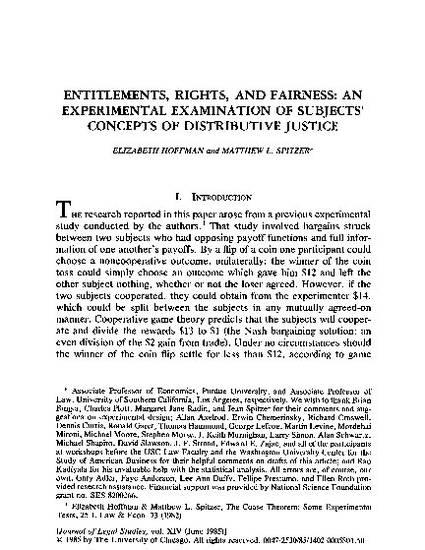
Article
Entitlements, Rights, and Fairness: An Experimental Examination of Subjects' Concepts of Distributive Justice
The Journal of Legal Studies
(1985)
Abstract
I. INTRODUCTION T. HE research reported in this paper arose from a previous experimental study conducted by the authors.1 That study involved bargains struck between two subjects who had opposing payoff functions and full information of one another's payoffs. By a flip of a coin one participant could choose a non-cooperative outcome, unilaterally: the winner of the coin toss could simply choose an outcome which gave him $12 and left the other subject nothing, whether or not the loser agreed. However, if the two subjects cooperated, they could obtain from the experimenter $14, which could be split between the subjects in any mutually agreed-on manner. Cooperative game theory predicts that the subjects will cooper- ate and divide the rewards $13 to $1 (the Nash bargaining solution: an even division of the $2 gain from trade). Under no circumstances should the winner of the coin flip settle for less than $12, according to game theory.
Disciplines
Publication Date
June, 1985
DOI
10.1086/467773
Publisher Statement
University of Chicago Press, 1985. Posted with permission.
Citation Information
Elizabeth Hoffman and Matthew L. Spitzer. "Entitlements, Rights, and Fairness: An Experimental Examination of Subjects' Concepts of Distributive Justice" The Journal of Legal Studies Vol. 14 Iss. 2 (1985) p. 259 - 297 Available at: http://works.bepress.com/elizabeth-hoffman/20/
